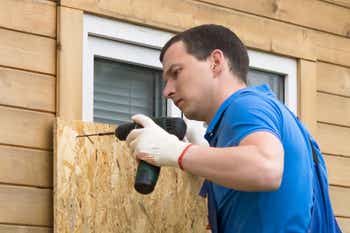Weather events and natural disasters torment Americans every year, and they seem to be increasing in frequency and severity. The National Oceanic and Atmospheric Administration reports that 2020 was the sixth consecutive year in which 10 or more billion-dollar weather and climate-related disaster events impacted the United States.
While some areas of the country are more prone to natural disasters than others, they can happen anywhere, so it’s best to prepare your home to protect against them. Here are steps you can take before a natural disaster – be it a tornado, wildfire, hurricane, flood or earthquake – strikes.
Tornadoes
There are more than 1,000 tornadoes a year, on average, in the U.S., and a typical season can run from March through December. With so many months of the year threatened by twisters, it is crucial to take steps to prepare your home for a tornado ahead of time.
- Learn the difference between a tornado watch and a tornado warning.
- Prepare for high winds by removing diseased and damaged limbs from trees.
- Identify a safe room within your home where family members should gather during a storm. Ideally, this is a basement, storm cellar or interior room on the ground floor with no windows.
- Secure or move indoors any outdoor items that may become projectiles, like furniture, potted plants and trash cans.
Wildfires
Rainy winters and prolific spring plant growth provide the perfect fuel for a devastating wildfire season. Wildfires can spread the size of a football field every three seconds, so the time to act is before the season starts. Mercury recommends 10 ways to prepare your home and family from wildfires.
Additionally:
- Plant fire-resistant plants and shrubs.
- Install fire-resistant roofing materials.
- Regularly clean your roof and gutters, and mow the lawn, clearing away clippings and dry twigs immediately.
- Keep garden hoses attached to faucets to aid fire personnel.
- Set aside household items like rakes, axes, saws, buckets and shovels that can be used as fire tools.
- Consider installing protective shutters or heavy, fire-resistant drapes.
- Install screens over attic vents with a mesh size of 1/8 inch.
Hurricanes
Hurricane season begins June 1, but storms can hit as early as May, so the earlier you take steps to prepare your home can make a vast difference in the safety of your family and property.
- Learn the elevation level of your property and whether the land is prone to flooding to help determine if your home will be affected during a storm surge or tidal flooding. If flooding is a concern, be sure you have flood insurance.
- Install storm shutters or laminated glass with impact-resistant glazing to protect windows during a storm. An alternative is to board up windows with plywood once a storm is predicted.
- Make sure trees and shrubs on your property are well-trimmed to make them more wind-resistant.
- Have a generator on-site in case of power outage.
- Note what outdoor furniture, decorations and other miscellaneous items would need to be brought indoors before a storm.
- If applicable, reinforce your garage doors with plywood to mitigate potentially dangerous and expensive structural damage.
- Locate the main power switch for utilities, as well as the main gas valve, in case you need to disconnect and close them during a storm.
- Clear gutters and downspouts of debris.
Floods
Flooding is the nation’s most common natural disaster. Make sure you have flood insurance – standard homeowners and renters insurance policies usually don’t cover damage caused by rising water related to weather or run-off from overflowing bodies of water.
- Elevate furnaces, water heaters and electrical components – switches, sockets, circuit breakers, and wiring – at least 12 inches above your home’s projected flood elevation and make sure they’re secured to a solid structure.
- Anchor any fuel tanks.
- Consider constructing barriers to prevent water from entering the building, as well as sealing basement walls with waterproofing compounds.
- Locate the main power switch for utilities, as well as the main gas valve, in case you need to disconnect and close them during a storm.
Earthquakes
Since earthquakes are unpredictable, the best time to prepare is as soon as you can. Standard homeowners and renters insurance policies don’t cover damage caused by earthquakes, so consider purchasing earthquake insurance if you live in an area where you might be affected. Mercury Insurance recommends 10 safety tips to take before, during and after an earthquake.
Also:
- Fasten shelves securely to walls and make sure large or heavy items are stored on lower shelves.
- Secure heavy items like pictures and mirrors to walls away from beds and areas where people sit.
- Hire a professional to repair defective wiring and leaky gas connections. Also seek professional help to look for signs of structural damage and to repair deep cracks in ceilings and the foundation.
- Locate safe spots in each room under a sturdy table or against an inside wall to take cover during an earthquake.
- Keep a wrench near your main gas valve and learn how to turn it off.
- Secure water heaters, furnaces, gas appliances and furniture by bolting them to wall studs.
- Install cabinet latches to prevent them from opening and spilling contents, such as dishes and glassware.
You should have an emergency plan in place for your family before any type of disaster strikes that includes a designated meeting place, emergency contact numbers and evacuation plan. Practice your plan at least twice a year to keep it fresh in everyone’s minds and make adjustments as needed. And if you have a pet, incorporate them into your evacuation plan, too.
You should also have an emergency kit that is easily accessible and includes basic survival items. FEMA recommends keeping three-day supplies of food and water for each family member. Consider also packing prescription medications, glasses, important financial documents, copies of insurance policies (and your agent’s contact information), a recent copy of your household inventory, birth certificates, social security cards and other identification in a portable waterproof container. It’s also a good idea to include $500 cash in small bills since ATMs and credit card processing units may be inaccessible during a power outage.
If you’re affected by a natural disaster, take the following steps to facilitate the claims process with your homeowner’s insurance:
When filing a claim
- Contact your insurance provider immediately to report a loss.
- Be prepared to provide your policy number.
- Do not remove debris or damaged property that may be related to your claim.
Steps after filing a claim
- Prepare a detailed inventory of destroyed or damaged property.
- Offer photos or video of your home and possessions to your adjuster, if these are available.
- Keep copies of communications between you and your adjuster.
- Keep records and receipts for additional living expenses that were incurred if you were forced to leave your home and provide copies to your adjuster.
Visit Mercury’s Catastrophe Center for additional tips and resources on protecting your home and family before, during and after a disaster.


